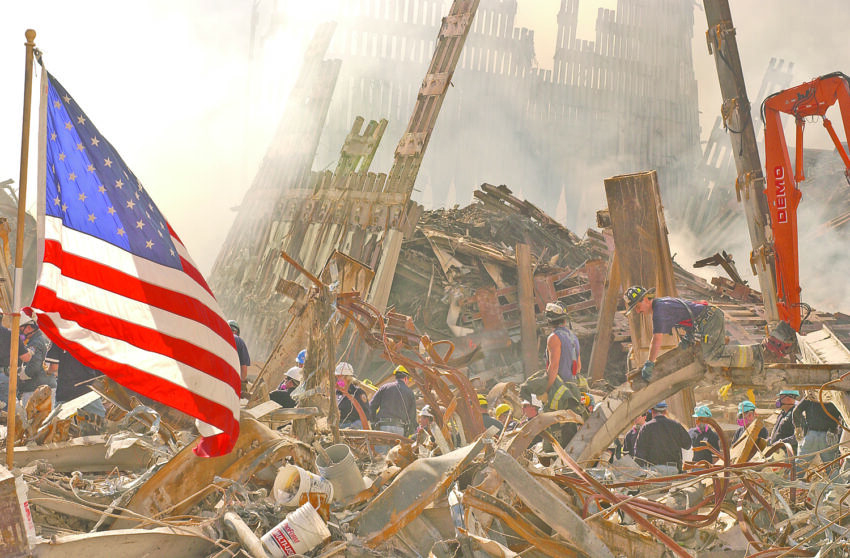Lee Trawick
reporter2@riverbendnews.org
"It didn't seem real. Before that day, no one had ever thought about a serious terrorist attack like that. It was a bad time," said Lafayette County resident Herbert Perry, reflecting on the day the world stood still.
On Sept. 11, 2001, Perry arrived at his hotel room in New York City around 2 a.m. Perry, a third baseman for the Chicago White Sox at the time, had flown up to New York the previous night for a series against the New York Yankees. However, things took an unexpected turn when he was awoken later that morning by a phone call from a sports broadcast radio station host that followed the Chicago White Sox. Chris "Mad Dog" Russo, now a television host with ESPN, was on the other end, asking him about a plane that had hit the World Trade Center. Perry was caught off guard by the phone call. He had no answer to what he was being asked.
Shortly after getting off the phone with Russo, Perry met teammates Paul Konerko and Tony Graffino in the hotel lobby. They were 40 blocks uptown, approximately two miles from the Twin Towers. The three began to head in the direction of the World Trade Center. They were around 20 blocks away when, at 9:03 a.m., United Airlines Flight 175, carrying 65 passengers, hit the center's South Tower. The attack came just 17 minutes after American Airlines Flight 11 crashed into the North Tower. Perry recalls how, after learning of the tragedy, the three looked at each other without saying a word, then turned around and returned to their hotel rooms. He remembered how the bustle of New York City -- the screeching of car brakes and the roar of pedestrian conversation -- was suddenly filled with a deafening silence. Only the shrill, heart-stopping sounds of emergency sirens converging on the towers cut through the sudden stillness. Perry remembers feeling almost numb to everything around him; he didn't know what to think. "We were about a mile away when the South Tower was hit. I didn't see it, but word spread quickly that another plane had hit," Perry said. "After the second plane hit, we could hear police over their speakers, saying, 'It was an attack, take cover.'"
Before Sept. 11, 2001, America didn't know of the hatred brewing toward her in Afghanistan and other regions. That day, no one in the streets knew what had happened outside of what they had just witnessed. By the time Perry had returned to his hotel room, 56 minutes after it was hit, the South Tower had fallen. Twenty-nine minutes later, the North Tower joined the pile of rubble that was once the World Trade Center. "No one ever dreamed that the towers would fall, so the thoughts were on," Perry said. "Who flies into a building on purpose? It was almost a state of disbelief." From the television in his room, he watched the carnage just two miles away. He recalls how angry America was as a whole following the attack. "To do what they did, to hijack planes and kill so many people like that, was just wrong," Perry said. "The next day was total silence. Now and then, you would hear a siren. The whole city was in shock. Nothing was open." He recalled practically being on lockdown for three days before his team could get a bus to Pittsburg, then a flight back to Chicago.
The chaos, the United States would discover, was not isolated to New York City. At 9:37 a.m., 34 minutes after Flight 175 struck the South Tower, American Airlines Flight 77 crashed into the western side of the Pentagon in Arlington, Va. Twenty-four minutes later, and four minutes after the South Tower collapsed, United Airlines Flight 93 crashed in an open field in Shanksville, Penn. It is believed Flight 93 was heading to the U.S. Capitol building in Washington, D.C., when its passengers attempted to overpower the hijackers after learning of the previous attacks from their cellphones. The attacks resulted in the deaths of 2,750 people at the World Trade Center, 184 at the Pentagon, 40 in Pennsylvania and more than 400 first responders. It has since been considered the worst attack on American soil since the attack on Pearl Harbor in 1941. On Monday, Sept. 11, the American Legion Harry C. Gray II Memorial Post 107 will honor the lives lost in these attacks with a memorial service at 10 a.m. Post 107 is located at 10726 142nd St., in McAlpin.

